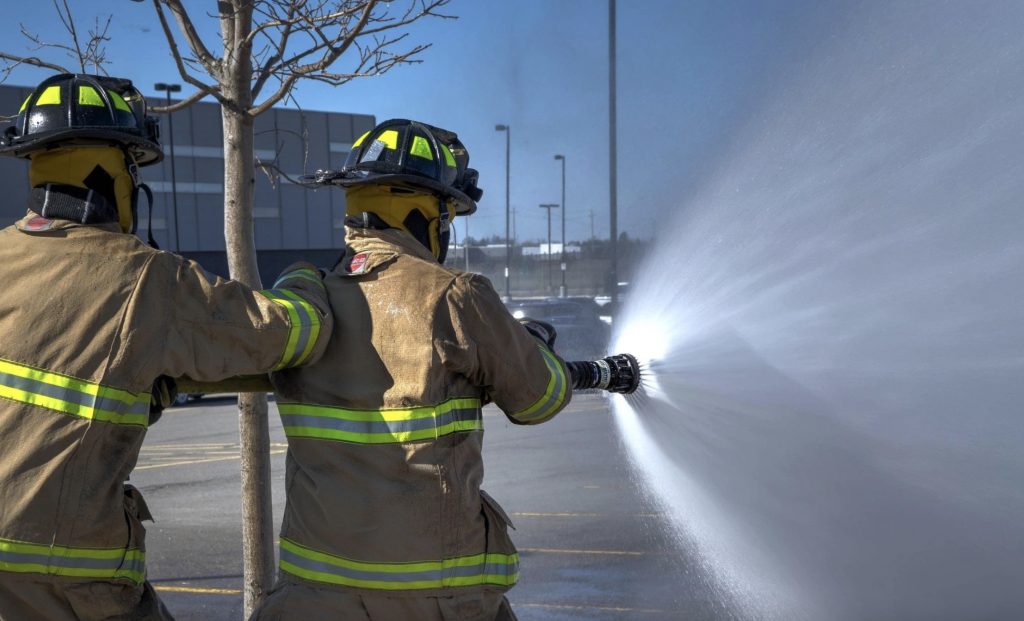Business
Fire Prevention: What can you do to prevent fire hazards in the workplace?

It is tough to maintain a large building that houses hundreds of offices for thousands of professionals. Companies need to provide their employees with several facilities in the office building, ensuring their safety is of prime importance. There are several examples of sudden emergencies which have proved life-threatening to employees. Fire hazards affect the safety and security of the structure and put employees’ life and company properties in jeopardy.
Office safety is critical to the safety of millions of dollars in commercial investments and the lives of thousands of employees. It is essential to prevent any chances of accidental fire in the workplace by implementing proper fire protection services. We have listed below several methods to mitigate the risk of accidental fire in workplaces.
1. Easy access to the equipment
Every company should have the required instruments for handling fire emergencies. This ensures that employees can prevent untoward incidents related to inadvertent fire ignition. They should be trained about the method to use the fire extinguishers or how to switch on the control panels. Furthermore, fire extinguisher inspections need to be done on a regular basis. The location of the fire extinguisher would depend on its accessibility, normally near the exit pathway, as per AS 2444 stipulation of Australian Fire Regulations. For better prevention, a firm can install fire sprinklers and alarms that act automatically as soon as it detects smoke or rising heat.
2. Ensure that all electrical equipment is in good working order
Short circuits are a common cause of accidental workplace fires. It is very important to maintain all electronic devices, appliances and machinery. It is critical to maintain and monitor all electronic devices, appliances, and machinery. Equipment should be inspected and serviced each month to avoid such hazardous incidents. If any employee senses any electrical malfunctions, it should be reported to the higher authorities immediately. Some appliances could cause fire outbreaks due to faulty wiring, power points, or light fixtures. It is recommended by Australian Fire Regulations to opt for Class E fire extinguishers to counter accidental workplace fires.
3. Proper disposal of industrial waste
Companies that produce commodities from inflammable raw materials should be cautious about their disposal. The materials created or discarded in the production process may include or generate flammable oils and chemicals.
Such explosive or flammable materials should be carefully contained in an appropriate bin until proper disposal has been arranged. Proper hazardous waste management helps prevent accidents or the spread of toxins.
4. Secure Storage Facilities
Businesses dealing with chemicals or other flammable substances should build a proper area for their storage. Several substances are combustible if they come in contact with water vapour or are kept at high temperatures. In Australia, summers can be severely hot. Chemicals should be stored in a particular environment to avoid adverse reactions.
5. Keep the office clean.
It is important to keep your office buildings clean for many reasons. First, a clean working setup boosts the energy and spirit of the workers. Second, too many files, documents, and boxes quickly become catalysts for the spread of a fire if one breaks out. A clean, organised office with adequate space around appliances can help prevent accidental short-circuit fires. Boxes and large objects should be kept clear from doorways to ensure everyone can safely and quickly exit the building in the event of a fire.
6. Proper training
As the saying goes, ‘prevention is better than cure’, so you should always take preventive measures to avoid any loss. Many fire protection services offer fire safety training to inform and equip your employees to help prevent accidental combustion or to act in case a fire ignites. Professional training includes when and how to use a fire extinguisher. For example, if the fire is not extinguished within three minutes, the room should be locked and blocked if possible to reduce oxygen flow to the room. The first step is always to ensure building occupants are aware and alert emergency services immediately. Effective training will help the employees properly react to such conditions and save their lives.
7. Spread awareness of emergency exit points with the employees
It is essential for a building to have several emergency exits on each floor. The first thought that comes to an individual’s mind when they hear a fire alarm is to escape as soon as possible. Office buildings feature a sufficient number of exits to ensure a rapid, calm, and orderly evacuation in case of a fire emergency. Employees should be aware of the emergency exit points and the access route for rescue workers who need to enter the building to fight the fire.
Conclusion
Fire can ignite and consume without warning. We should always be ready for any situation. The best way for a company to ensure the safety of its employees and assets is to contact fire protection services experts to ensure regulatory standards are met, equipment is properly maintained, and employees are trained to act in the event of a fire.
Business
Struggling with Debt? Here’s a Simple Guide to Finding Relief Without Adding More Stress


Finding Relief Without Adding More Stress
Debt can feel like a heavy weight on your shoulders. You’re not alone – millions of Americans struggle with financial obligations every day. As Benjamin Franklin wisely noted, “Many a man thinks he is buying pleasure, when he’s really selling himself to it.” Let’s explore how to find relief without adding more stress to your life.
Why Debt Is More Common Than You Think
The numbers tell a powerful story. The average American household carries approximately $273,904 in federal debt according to recent statistics. This isn’t just a personal problem – it’s a national reality.
Feeling ashamed about debt? Don’t. Financial challenges affect people from all walks of life.
Even the federal government struggles with debt management, reporting a deficit of $1.1 trillion at the end of April 2025, which is 13% higher than the same time last year.
What Is Debt Relief?
Debt relief involves strategies to reduce or restructure your financial obligations, making them more manageable. It’s different from taking out more loans or declaring bankruptcy.
Relief programs typically negotiate with creditors to lower interest rates, reduce balances, or create more favorable repayment terms.
5 Signs You Might Benefit from Debt Relief
- You’re Only Making Minimum Payments. When you can only afford minimum payments, you’re mostly paying interest rather than reducing principal. This creates a never-ending cycle.
- You’re Using Credit to Pay for Necessities. Relying on credit cards for groceries, utilities, or rent indicates financial strain that needs addressing.
- You’re Receiving Collection Calls. Frequent calls from creditors or collection agencies signal that your debt situation has become serious.
- Your Debt-to-Income Ratio Exceeds 40%. If more than 40% of your monthly income goes toward debt payments, you may benefit from professional help.
- You Feel Overwhelmed by Financial Stress. When debt causes anxiety, sleep problems, or relationship strain, it’s time to seek solutions.
The Debt Relief Process Explained
1. Free Consultation
Most reputable debt relief services start with a no-cost assessment of your financial situation. This helps determine if you’re a good candidate for their programs.
According to CBS News, qualifying for debt relief in 2025 typically requires meeting certain thresholds, including credit score requirements and debt-to-income ratios, with more flexible options available through third-party debt relief programs compared to direct consolidation loans.
2. Personalized Plan Development
After analyzing your debts, income, and expenses, specialists create a customized strategy tailored to your specific situation.
“It’s a great idea when you’re struggling with debt to get free debt advice from a charity or a debt non-for-profit,” notes Businessing Magazine. These organizations can help you work out your debts and create a manageable budget.
3. Creditor Negotiation
Professional debt relief services negotiate directly with your creditors, potentially reducing interest rates, waiving fees, or even lowering principal balances.
This negotiation process can save you significant money and stress compared to trying to negotiate on your own.
Choosing a Trustworthy Service
The Federal Trade Commission recently announced a permanent ban on a fraudulent debt relief operation, highlighting the importance of selecting legitimate services.
Search for companies with transparent fee structures, clear explanations of their process, and no upfront fees before services are delivered.
Check reviews, ratings with the Better Business Bureau, and ask about their success rates with clients in situations similar to yours.
Cero Deuda: Support for Hispanic Americans
For Spanish-speaking Americans, Cero Deuda offers specialized debt relief services that understand cultural nuances and language preferences.
Their three-step process includes financial analysis, creditor negotiation, and creating personalized payment plans that typically span 12-48 months.
What sets them apart is their cultural understanding and bilingual support, making the debt relief process more accessible and comfortable for Hispanic communities.
Taking the First Step
The journey to financial freedom starts with a single step: acknowledging your situation and seeking help. Get in touch debt experts contact number for a free consultation to understand your options.
Remember that finding relief from debt is a process, not an overnight solution. With patience and the right support, you can gradually reduce your financial burden and the stress that comes with it.
The path to financial wellness is available to everyone – you just need to take that first step.
Read More: one piece filler
Business
What Makes a Polycarbonate Sheet Ideal for Weather-Resistant Installations


No other material other than polycarbonate sheet comes to mind when it involves installation of weather-resistant applications. Featuring unmatched strength, mouldiness and durability, it comes as no surprise that it is extensively used by industries from different backgrounds.
This article highlights why a polycarbonate sheet is recognised as a go-to material among industries looking for long-term and unsullied weather-resistant applications. We will dissect its various key lineaments, such as unmatched strength, durability, lightweightness and more that make it ideal for applications in different industries.
Unmatched Weather Resistance
Among the most salient features of a polycarbonate sheet is its waterproofness, which easily makes it a no-brainer for installation in all applications. No matter how scorching summers are, how chilly winters are, or how torrential rains are, these sheets remain intact and deliver a virtuoso performance all the time.
- It is resistant to ultraviolet rays, so when the sheet dries up, it does not turn yellow or split.
- Even temperatures ranging from -104°F to 248°F do not affect its performance at all.
Second to None Impact Strength
A polycarbonate sheet is a paradigm of unparalleled strength, which makes it a far more considerable choice for installation than glass. This material sheet does not lose its effectiveness and functionality but remains standing still even when intense winds strike.
- It is hundreds of times superior to glass in terms of strength.
- It does not pose any threat to the environment or human and animal lives.
Lightweight Yet Hard-wearing
Even being relatively lighter than glass, their unmatched hard-wearing property makes its installation in various industrial applications a no-brainer again.
- Contracted requirements of structural support.
- Ferrying and installing it requires no consideration.
Flexibility in Application
These sheets are adaptable enough to make them perfect for a variety of applications, for example:
- Skylights
- Greenhouses
- Outdoor signage
- Covered walkways
Final Thoughts
A polycarbonate sheet is a perfect and smart choice for those looking to get unsullied flawless safety in their applications all the way. Its remarkable versatility makes it a no-brainer for every industry.
Planning to put a polycarbonate sheet into a residential or commercial place? Consider choosing https://www.plastral.com.au/ only, as it has won spurs as a leading supplier of premium polycarbonate sheets at the most competitive rates. Look at the wide-ranging compilation of our products; choose them depending on your project’s needs and goals.
Read More: Jacqulyn Elizabeth Hanley
Business
Nike Forecast 2025: What’s Coming Next for the Sports Giant?


Introduction – What Is the Nike Forecast?
First of all, a forecast means a guess about what will happen in the future. So, the Nike forecast tells us what might happen to Nike’s stock and business next year. People who invest money in Nike really want to know this. That’s because they need to decide if it’s a good time to buy, hold, or sell Nike stock. Nike is one of the biggest sports brands in the world, so what happens to the company is important. While it has been strong in the past, things can always change. For example, sales can go down or up, and new ideas can help or hurt the company. Because of that, we must look at many things—like how Nike is doing now, what its plans are, and what experts think. In this article, we will explain everything step by step. As a result, you’ll understand Nike’s future more clearly.
A Quick Look at Nike’s History
It was first called Blue Ribbon Sports in 1964. Later, in 1971, it became Nike. It was started by two men, Phil Knight and Bill Bowerman. They wanted to make better shoes for runners. Over time, Nike grew bigger and stronger. Because of smart ideas and good products, it became one of the top sports brands in the world. Today, Nike sells shoes, clothes, bags, and other sports gear. In fact, it makes most of its money from selling shoes. Even though it began in the United States, Nike now sells products all over the world. Also, it became a public company in 1980, which means people can buy and sell its stock. Since then, many people have invested in Nike. Clearly, the company has come a long way. However, to know what comes next, we must look at more recent facts.
Where Nike Makes Its Money
To understand the Nike forecast better, we also need to know how the company earns its money. First of all, most of Nike’s income comes from selling shoes. These include sports shoes, running shoes, and even shoes for style. However, in the last few months, shoe sales have slowed down. Next, Nike makes money from clothes like shirts, pants, and jackets. These are often sold with the shoes to match. Then, the company also sells sports gear, like gloves, socks, and backpacks. Even though this part makes less money, it still helps. On top of that, Nike makes sales through its own website, app, and stores. This part is called Nike Direct. Because Nike sells directly to customers, it makes more profit. As you can see, Nike has many ways to make money. Still, if some parts slow down, it can hurt the company’s growth. So, every area matters.
What the Stock Charts Are Showing
When we look at the Nike forecast, we also have to study the stock chart. Right now, Nike’s stock is trading below the 100-day moving average. This usually means the stock is in a downtrend. In other words, the price has been falling. However, not everything is bad. For example, the MACD, which is a chart tool, is showing a sign that prices might go up soon. So, the stock could fall to $57 first. But after that, it might rise again. If things go well, it could go up to $80. In the best case, the price might even reach $111. That could happen if Nike solves some of its problems. For example, clearing out extra products and boosting sales could help. While there is hope for growth, we should also be careful. Because the future is not promised, investors must watch things closely.
Risks That Could Affect the Forecast
Although Nike is a strong company, there are still many risks. First of all, higher taxes on goods from China and Mexico could make it harder for Nike to earn money. This could hurt profits. Also, sales have dropped, especially in China, where they fell by 17%. Even though Nike is trying a “Win Now” plan to improve things, nobody knows if it will work. Furthermore, other companies like Adidas and New Balance are becoming stronger. They are selling more shoes, especially cool, old-style ones. Because of this, Nike may lose some customers. On top of that, many people have less money to spend because of inflation. So, they might not buy new sports clothes or shoes. As a result, Nike could make less money. While some problems can be fixed, others are harder to control. That’s why these risks are very important when looking at the forecast.
What Could Help Nike Do Better?
Even though Nike has some problems, there are still many ways it can improve. First of all, the company can sell off its extra products. By doing that, it will have space for new items. Also, Nike is working hard to make its website and app better. More online sales can really help. Moreover, if Nike focuses on big cities and gives better deals, it could sell more. Another thing that can help is making new and fun designs. Since people love stylish sportswear, good designs can bring them back. In addition, working with famous athletes or brands might make Nike more popular. While it’s not easy to fix every problem, strong plans can make a big difference. Because Nike is a smart and creative company, it still has a chance to grow. So, with better ideas and smart choices, Nike can still do well in 2025.
What Experts Say About the Nike Forecast
Many experts have shared their views about the Nike forecast. Some think the stock might first fall to $57. That’s because sales are weak and there is a lot of extra stock. However, others believe it could rise to $80 if the company makes smart moves. A few even think it can go as high as $111, but only if everything goes really well. For example, if Nike clears out old items, improves online sales, and beats its competition, it may do better. But experts also warn that there are still risks. Things like high taxes, slow sales, and money troubles around the world can hurt Nike’s growth. Because of this, they say investors should watch carefully. Even though Nike is still strong, the future is not simple. So, listening to expert advice and checking updates often is very important. After all, good choices depend on good information.
Conclusion
The Nike forecast shows both good and bad signs. On one hand, Nike is a well-known brand with strong roots. It has a history of making smart moves. On the other hand, there are many challenges ahead. Problems like falling sales, strong competition, and economic trouble can slow down growth. But even so, Nike still has a chance to do better. If it clears extra stock, brings new designs, and focuses on key areas, it may rise again. That’s why it is smart to keep an eye on Nike. Whether you are a fan of the brand or someone who wants to invest, the forecast gives helpful clues. By knowing what to expect, you can make better choices. So, always stay updated and think before you act. Watching Nike’s future closely could be a smart step, especially in the fast-changing world of business.
-



 Biography6 years ago
Biography6 years agoJacqulyn Elizabeth Hanley is the Mother of Liza Soberano?
-



 Home5 years ago
Home5 years agoEpson L3110 Driver Free Download Latest Updated Version
-



 Games4 years ago
Games4 years agoBest Free To Play MMORPG To Try This 2021
-



 Biography6 years ago
Biography6 years agoAmanda Levy Mckeehan Biography, Family, Net Worth, Age, Affairs, Facts
-



 Biography6 years ago
Biography6 years agoWho is Rose Dorothy Dauriac? Scarlett Johansson Daughter?
-



 Biography6 years ago
Biography6 years agoJessica Ditzel Secret Information that Nobody Knows | Joe Rogan’s Wife
-



 Biography6 years ago
Biography6 years agoWhat is the relation of Nathaniel Larry Osorno with Liza Soberano?
-



 Home6 years ago
Home6 years agoLiza Soberano Biography, Age, Family and Boyfriends































